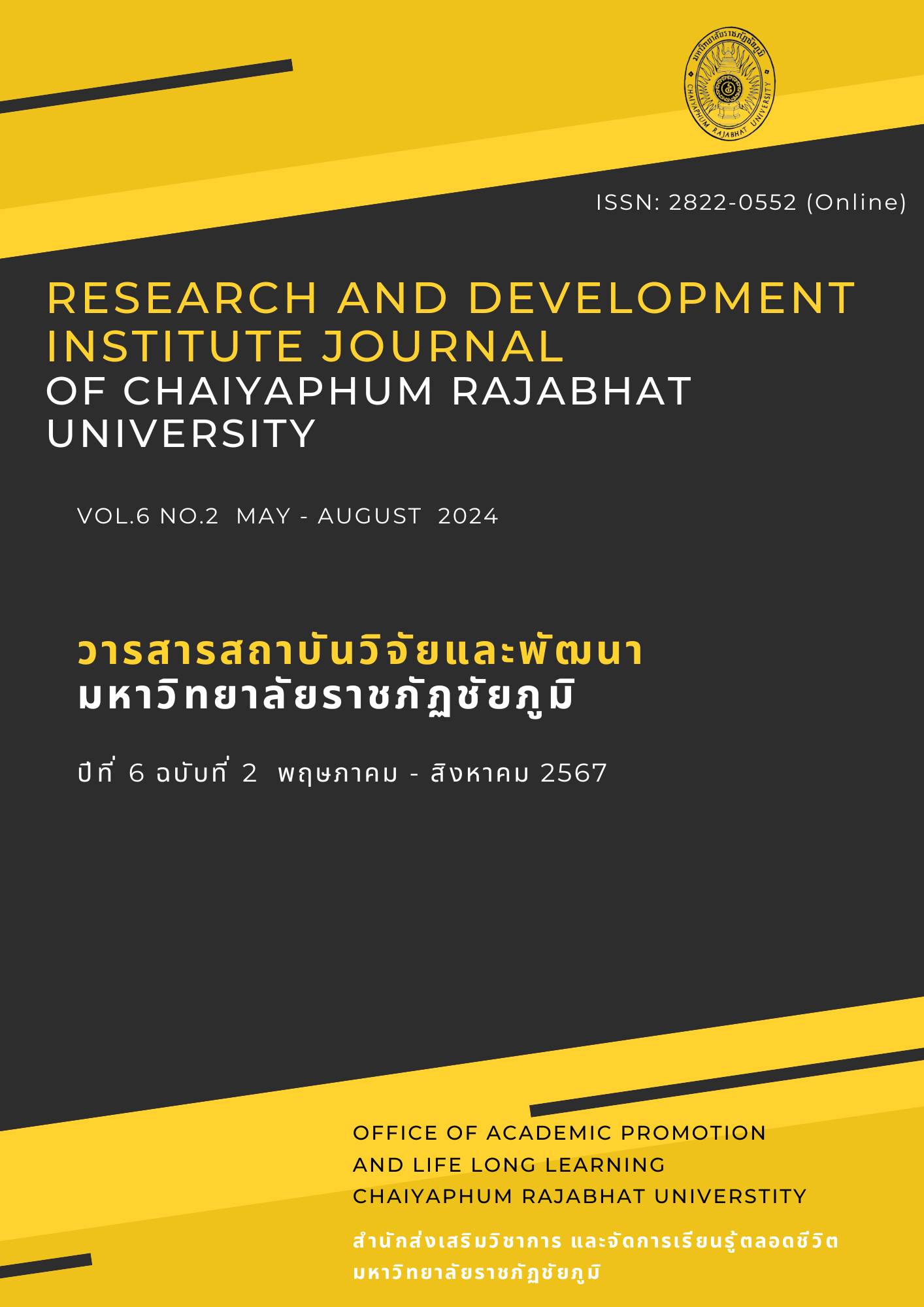THE DEVELOPMENT OF THE QUALITY OF LIFE OF CHILDREN AND YOUTH IN THE SKIPPED- GENERATION FAMILIES
Main Article Content
Abstract
The objectives of the research were to: 1) develop the potentiality of networks in sub-district, 2) develop the quality of life for children and youth and 3) evaluating the effectiveness of enhancing the quality of life of children and youth in skipped- generation family. The target group used for the research was 230 teachers and students who were children and youth in all 8 schools in Chaiyaphum Province who applied to participate in the project. Data were collected using semi-structured interviews, interviewees were able to listen to and answer all questions immediately and 8 evaluation questions on the project's effectiveness (IOC = 0.67 - 1.00.), and project effectiveness evaluation forms. Analyzing the data using descriptive statistics and content analysis.
The results were as follows:
1) The development of the potential of the sub-district area network of children and youth in skipped-generation families consisted of 6 steps, including (1) meeting with administrators or representatives (2) recruiting students who were interested in the same career; at least ten people per career group; 1-2 advisors; and (3) detailed documents for applying to the project. (4) carry out activities, (5) evaluate and monitor projects, and (6) exchange knowledge between groups.
2) The vocational training and life skills project, including Vocational training project for barbers, sandalwood flowers production, Na Fai Barber, Tao Huay Uay Rak, and sandalwood flowers production project, butter-covered banana chips project, Khao Taen Nam Taeng Mo Project, growing grey oyster mushroom project, Turkey raising, the beautician dance club project, fried herbal insects project Barber, overflowing sandwich, and DIY ribbon transformation project. In terms of life skills, children and youth can learn how to solve problems, plan activities, collect information and apply information appropriately, leading to decision-making.
3) The evaluation of the quality of life of children and youth in skipped-generation families found that, overall, the project could create a career for students, practice analytical thinking and problem-solving skills, and provide a meeting among members with advisors. They integrated learning subjects. Parents or communities recognized the vocational training project at a high and the highest level. The factors that facilitate the schools' achievement objectives include budget, personnel, follow-up, cooperation of all parties, and extension of community-to-school activities. Students were interested in the project, teachers' and parents' support, and local materials' use.
Article Details

This work is licensed under a Creative Commons Attribution-NonCommercial-NoDerivatives 4.0 International License.
Permission to use text, content, images, etc. of publication. Any user to read, download, copy, distribute, print, search, or link to the full texts of articles, crawl them for indexing, pass them as data to software, or use them for any other lawful purpose. But do not use it for commercial use or with the intent to benefit any business. Published under a Creative Commons Attribution-NonCommercial-NoDerivatives 4.0 International License.

This work is licensed under a Creative Commons Attribution-NonCommercial-NoDerivatives 4.0 International License
References
กันต์ณภัทร หาญละคร, นักเรียน. (2567, มกราคม 22). สัมภาษณ์.
เกียรติประวุฒิ เดชัย. นักเรียน. (2567, กุมภาพันธ์ 12). สัมภาษณ์.
ตุลย์รภัทร ศรีพระราม. นักเรียน. (2567, มกราคม 22). สัมภาษณ์.
ประทุมทิมพย์ เกรียมโพธิ์. ครู. (2567, กุมภาพันธ์ 12). สัมภาษณ์.
ปาณิศา กองสังข์. ครู. (2567, กุมภาพันธ์ 12). สัมภาษณ์.
เพชรา พิพัฒน์สันติกุล, และ สมใจ หุตะสุขพัฒน์. (2566). รูปแบบการพัฒนาเยาวชน 4.0 เพื่อสร้างนวัตกรรมเชิงทักษะอาชีพอย่างมีความคิดสร้างสรรค์. วารสารวิจัยราชภัฏธนบุรีรับใช้สังคม, 9(1), 34-48.
ภูเบศร์ สมุทรจักร, ธีรนุช ก้อนแก้ว, และ ริฎวัน อุเด็น. (2560). ความอยู่ดีมีสุขของครอบครัวไทย.สถาบันวิจัยประชากรและสังคม มหาวิทยาลัยมหิดล นครปฐม. https://ipsr.mahidol.ac.th/wp-content/uploads/2022/03/Report-File-539.pdf
วินัดดา ปิยะศิลป์. (2546). ครอบครัวกับวัยรุ่น. กรุงเทพฯ: สำนักงานกิจการสตรีและสถาบันครอบครัว.
สำนักงานพัฒนาสังคมและความมั่นคงของมนุษย์จังหวัดชัยภูมิ. (2566). สถานการณ์ทางสังคมจังหวัดชัยภูมิ ประจำปี 2566. ชัยภูมิ.
อาภรณ์ ภู่วิทยพันธุ์. (2550). Career Development in Practice (พิมพ์ครั้งที่ 3) . กรุงเทพฯ: เอช. อาร์. เซ็นเตอร์.


